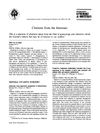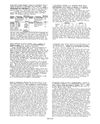 March 2023 in “International Journal of Trichology”
March 2023 in “International Journal of Trichology” Using both minoxidil and finasteride together is more effective for male hair loss than using either one alone.
March 2021 in “AACE clinical case reports” A man with both Klinefelter syndrome and primary hyperparathyroidism showed a rare combination of symptoms and genetic patterns.
 November 2020 in “Ukraïnsʹkij žurnal sučasnih problem toksikologìï”
November 2020 in “Ukraïnsʹkij žurnal sučasnih problem toksikologìï” Minoxidil lotion may harm male reproductive health.
 February 2020 in “Open Access Macedonian Journal of Medical Sciences”
February 2020 in “Open Access Macedonian Journal of Medical Sciences” The patient with severe hirsutism improved after being diagnosed with non-classic congenital adrenal hyperplasia and treated with corticosteroids.
 February 2019 in “Obstetrics and gynaecology cases - reviews”
February 2019 in “Obstetrics and gynaecology cases - reviews” Women with excessive hair growth tend to have shorter index and ring fingers compared to others.
Diphenyl cresyl phosphate has low toxicity but can harm the liver, kidneys, adrenal glands, and testicles at high doses.
 December 2013 in “Iranian Journal of Applied Animal Science”
December 2013 in “Iranian Journal of Applied Animal Science” Adding bentonite clays to goat diets increased milk yield, periwinkle shell improved chicken egg production, and vaccination increased muscle area and carcass yield in calves.
 December 2010 in “Vestnik dermatologii i venerologii”
December 2010 in “Vestnik dermatologii i venerologii” Certain genes and X chromosome patterns may significantly contribute to the development of hair loss.
May 2018 in “Hair transplant forum international” Topical finasteride promotes hair growth with minimal side effects but needs more research for women and optimal use.
 July 2017 in “Indian journal of sexually transmitted diseases and AIDS”
July 2017 in “Indian journal of sexually transmitted diseases and AIDS” Finasteride, a hair loss drug, can cause sexual side effects like erectile dysfunction in 2.1%-3.8% of users, but these usually go away with time or if the drug is stopped. Despite this, its impact on sexual function is minimal for most men.
 April 2024 in “JCEM case reports”
April 2024 in “JCEM case reports” A man's breast enlargement from low-dose finasteride for hair loss didn't go away, even with treatment, and might be more common than reported.
 3 citations,
June 1995 in “International Journal of Gynecology & Obstetrics”
3 citations,
June 1995 in “International Journal of Gynecology & Obstetrics” Laser laparoscopy effectively reduces pelvic pain in women with mild to moderate endometriosis and is safe to use.
 8 citations,
October 2017 in “Dermatology practical & conceptual”
8 citations,
October 2017 in “Dermatology practical & conceptual” A spermidine-based supplement may help hair grow longer by keeping it in the growth phase.
 January 2023 in “Mastology”
January 2023 in “Mastology” Hormone therapy for breast cancer often leads to sexual issues like vaginal dryness and decreased libido.
 October 2007 in “Clinical Biochemistry”
October 2007 in “Clinical Biochemistry” New genotype linked to non-classical congenital adrenal hyperplasia found in Italian siblings.
 April 1974 in “Pediatric Research”
April 1974 in “Pediatric Research” The Naked (N) trait in mice is linked to lower glycine and tyrosine in hair proteins.
 431 citations,
October 2008 in “Current Medicinal Chemistry”
431 citations,
October 2008 in “Current Medicinal Chemistry” Coumarin derivatives show promise as anti-estrogenic agents for treating breast cancer, with some in clinical trials.
 237 citations,
January 2010 in “The Journal of Sexual Medicine”
237 citations,
January 2010 in “The Journal of Sexual Medicine” The report recommends personalized treatment for women's sexual dysfunctions and more research on effective therapies.
 198 citations,
October 2011 in “Journal der Deutschen Dermatologischen Gesellschaft”
198 citations,
October 2011 in “Journal der Deutschen Dermatologischen Gesellschaft” Use minoxidil for hair loss; finasteride and dutasteride for men, dutasteride for women.
 188 citations,
May 2009 in “Plant physiology”
188 citations,
May 2009 in “Plant physiology” Researchers found 19 genes important for root hair growth in a plant called Arabidopsis.
 101 citations,
November 1992 in “Archives of Dermatology”
101 citations,
November 1992 in “Archives of Dermatology” Steroids help hair regrowth, and minoxidil slows post-steroid hair loss, but effects are temporary.
 98 citations,
May 2008 in “British Journal of Dermatology”
98 citations,
May 2008 in “British Journal of Dermatology” There are many treatments for permanent hair loss disorders, but their effectiveness varies and there's no clear best option.
 88 citations,
February 2008 in “Journal of Medicinal Chemistry”
88 citations,
February 2008 in “Journal of Medicinal Chemistry” Scientists made the first metal-based compounds from a nonsteroidal antiandrogen drug, which showed potential in fighting both hormone-dependent and independent prostate cancer cells.
 76 citations,
May 2011 in “Liver transplantation”
76 citations,
May 2011 in “Liver transplantation” Liver transplantation is a viable option for children with propionic acidemia, improving quality of life and diet, but does not remove all risks and long-term brain outcomes are uncertain.
 72 citations,
July 2008 in “Dermatologic Therapy”
72 citations,
July 2008 in “Dermatologic Therapy” CCCA is a scarring hair loss condition mainly in African descent women, possibly caused by genetics and hairstyling, treated with gentle hair care and medications.
 67 citations,
January 2007 in “Climacteric”
67 citations,
January 2007 in “Climacteric” Estrogens and SERMs can help with skin aging, but their safety and effectiveness need more research.
 49 citations,
November 1992 in “Archives of dermatology”
49 citations,
November 1992 in “Archives of dermatology” Different treatments for alopecia areata have varying success rates and side effects; intralesional steroids are most effective.
 48 citations,
October 1996 in “Dermatologic clinics”
48 citations,
October 1996 in “Dermatologic clinics” Some treatments can help with hair regrowth in alopecia areata, but results vary and long-term use is often needed without changing the disease's outcome.
 47 citations,
January 2019 in “Nature communications”
47 citations,
January 2019 in “Nature communications” Polyamines help fix DNA damage accurately in cells.
 44 citations,
September 2012 in “Archives of Dermatology”
44 citations,
September 2012 in “Archives of Dermatology” Hair breakage may be an early sign of a hair loss condition called CCCA in African American women.


























